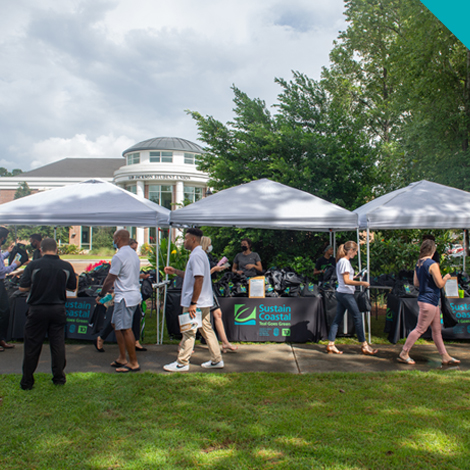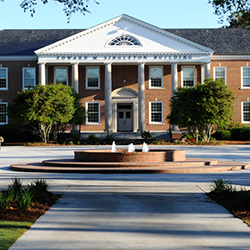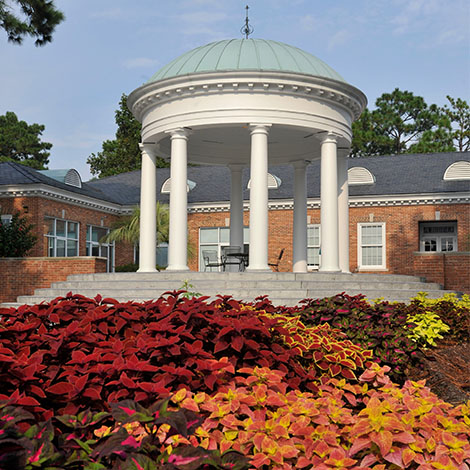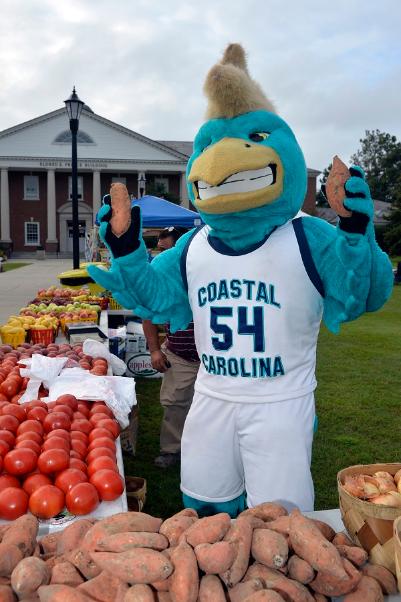2023-2024 Sustainability Grant Awardees
Addressing the sources of CCU's floating debris discharge into the adjacent wetlands
Jason Brunicke, Student; Till Hanebuth, Professor, Marine Science; Cara Schildtknecht, Waccamaw Riverkeeper; Katie Finegan, Research Affiliate
Most of the surface and underground water runoff of Coastal's campus and its associated student residence areas is drained through a pipe system underneath Hwy 544 into the Waccamaw National Wildlife Refuge wetlands. The runoff transports large amounts of floating anthropogenic debris (FAD; aka plastic trash, hazardous materials).
This emerging issue leads to twofold concerns: a) If Coastal wants to be received as a main player towards more sustainable approaches, its own backyards should appear clean; 2) the Waccamaw National Wildlife Reserve and other wetlands are significantly affected by this FAD discharge. It is proposed to install self-designed and self-constructed FAD barrier collectors at those 3 sites through which nearly all of Coastal's FAD is currently draining. Frequent clearance of the collection structures will allow for both removing the debris from the wetlands as well as generating a long-term science-based data set that informs about the various types regarding CCU's and Hwy 544's debris discharge.
The ultimate goals are to:
a) Identify and address Coastal's FAD output issue to significantly reduce this type of contamination;
b) Demonstrate Coastal's engagement towards a cleaner and more sustainable environment;
c) Establish a long-term, highly visible activity with significant technical and scientific involvement of CCU undergraduate and graduate students;
d) Demonstrate a technical solution that might have the potential to spread over the coastal region regarding tracing and addressing contamination sources;
e) Further develop the FAD analytical capacity at Coastal; and
f) Prevent that Coastal further loses its reputation as one of the main contaminators for the valuable and vulnerable Waccamaw wetlands.
This proposal was prepared with the support of Jason Brunicke, MSCI undergraduate and Honors College student.
CCU Cycles Safely
Sara Rich, Assistant Professor, HTC Honors College; Dory Sibley, Assistant Professor, Theatre; Brian Nicosia, Coordinator of Outdoor Recreation
On behalf of CCU's Bicycle Advisory Council (BAC), CCU Cycles Safely is a new campus initiative to encourage cycling as a safe and reliable alternative mode of transportation on and off campus. This proposal identifies essential first steps in this larger initiative by ensuring that current and potential cyclists on campus can repair their bicycles free of charge at various convenient locations around campus. Riding a well-functioning bicycle is fundamental to riding safely, and expanding access to free, simple repairs will encourage continued and expanded use of bicycles around our campus community. The BAC Fall 2022 Cycling Survey indicated that respondents would be more likely to ride to classes and off campus if they could perform routine maintenance (such as airing up tires) at residence halls and other convenient locations.
Community Garden and Compost Collection Facility
Dominique Cagalanan, Director of Arboriculture; Joshua Whitney, Horticultural Manager; Cassandra LaValley, Sustainability Coordinator
This project will integrate the work of Grounds and Sustain Coastal, two separate departments under Campus Environments, through building a community garden and compost collection facility on campus. This project will advance progress towards CCU’s commitment to sustainability while fostering sustainable practices and a general culture of sustainability among members of the CCU community; offering new opportunities for students, faculty, and staff to engage with and learn from one another; and providing opportunities for experiential learning. By being located directly across the street from the freshman residential buildings (and in a currently under-utilized space), we hope and anticipate that the community garden and compost collection facility will increasingly become a part of campus life and encourage students to adopt more sustainable practices early on, creating lifestyle habits they can carry with them beyond their time at CCU.
Waccamaw Indian People Traditional Ecological Knowledge & Cultural Heritage Exhibit
Carolyn Dillan, Professor and Associate Dean, Spadoni College of Education and Social Sciences; Katie Stringer Clary, Assistant Professor, Interdisciplinary Studies
This co-curricular and interdisciplinary project creates a collaborative outdoor exhibit through a partnership between CCU faculty/students, and the Waccamaw Indian People (WIP), a state-recognized Native American tribe whose traditional territory extended throughout Horry County, SC. The research and design of the proposed exhibit is embedded in experiential learning and new QEP initiatives through three undergraduate courses at CCU (SESS 301 [QEP course], ANTH 432, and IDS 430), where students work hand-in-hand with community partners to conduct interviews, participate in environmental/cultural surveys, research and design exhibit content, and install exhibit materials within the Tribal Grounds. This project contributes to educational efforts within Horry County to increase students’ and the public’s understanding of traditional ecological knowledge (TEK) and sustainable land stewardship.
Outreach efforts partner with the Indigenize SC Education Task Force to create and distribute supplemental materials for local teachers, as well as become part of the WIP’s educational programs hosted during their annual School Days. CCU students learn how the lands of the Waccamaw Indian People are maintained in traditional indigenous ways; how to restore and preserve the cultural heritage and biodiversity that persists within the Tribal Grounds and surrounding region; and connect with tribal members and the community as stewards of the land by providing advanced opportunities for learning about TEK. By developing an outdoor interpretive trail and exhibit space on the Waccamaw Tribal Grounds, we will advance Sustainable Development Goals 4, 11, 12, and 15, through education, sustainable community, responsible consumption, and protection of life on land.
Water Mark / Metal Recycling
Michael Woodle, Associate Professor, Visual Arts
Metalsmithing is a field that struggles with its intense impact on the environment due to destructive mining processes. Less understood is that metalsmithing is a field that has relied on recycling from its earliest development. Due to the high cost of production and the inherent value in the material itself, scraps generated in making work have been meticulously recycled for the entire history of the field. Large refineries conduct most of the recycling but charge massive fees to the small producers. As a result, students at Coastal Carolina University are not able to process their materials effectively and affordably. Moreover, the cost of having to continually purchase new material disproportionately impacts students with less flexible incomes. By introducing a metal recycling system into the metalsmithing curriculum we will expand students' abilities to make the work they want to make, recover material lost in production, rebalance socioeconomic inequality in the classroom, and decrease the carbon footprint of anyone working in precious and semi-precious materials. Once the system is online it can also be made available to the CCU science programs.
The equipment will also be used in conjunction with a 2023-2024 Professional Enhancement Grant to more sustainably produce a new body of work, Water Mark. This body of work will document the effects of flooding, climate change, and socioeconomic inequality. The introduction of recycling processes will effectively extend the material budget for the project by approximately 30% while reducing the impact of material production on the environment.
Zero-Waste Performance Festival: A Sustainable Celebration of Art and Action
Benjamin Sota; Sandrine Schaeffer; Sadie Desantis
Zero-Waste Performance Festival: A Sustainable Celebration of Art and Action (ZWPF) The festival is a zero-waste event powered by participant kinetic energy and/or solar power that provides Coastal Carolina University students with an opportunity to present eco-work and engage the wider community. Our festival is co-presented by CCU, Conway Downtown Alive and Myrtle Beach Downtown Alliance, fostering discussions about sustainability with diverse audiences in our local communities.
ZWPF was inspired by a group of students who were passionate about showcasing diverse forms of artistic expression. Festival development incorporates existing courses in the Visual Arts Studio Department in addition to the pilot of a new fall course in the Theatre department. These courses instruct students about sustainable site-specific theatre and this work reflects a hybrid of theoretical and experiential learning to help culminate in the ZWPF festival. The festival's production fits within larger goals in the Theatre and Visual Art departments by centering interdisciplinary collaboration and the integration of sustainability into current and new curriculum.
This project contributes to the Sustainable Development Goal of Climate Action by teaching students about the importance of sustainable practices in the creation of site-specific theatre and performance art. The project improves student learning, engages students in contemplative pedagogy, and impacts the university and wider community by promoting sustainable practices in the arts and raising awareness about the importance of sustainability.
Seafood, Mercury, and Human Health in Coastal South Carolina
Russell Fielding; Zenobia Harper
Fishing can represent an environmentally sustainable way to produce protein- and vitamin-rich foodstuffs while offering cultural and economic benefits to local communities. Seafood consumption is also the main path by which people are exposed to mercury, especially the more toxic organic form known as methylmercury, which can negatively affect human health. For a fishery to be sustainable, then, balance must be sought among its cultural, economic, environmental, and human-health aspects. This community-engaged project will focus upon the human health aspect of fisheries and seafood consumption in coastal South Carolina.
A simple and effective way to measure mercury exposure in humans is through the laboratory analysis of hair samples. Together with data on diet and health history, mercury concentrations measured from hair samples can inform researchers about interactions between environmental pollution and human health in seafood-dependent areas. This project will use a novel methodology that Fielding recently developed and implemented in the Caribbean. Specifically, we will partner with local barbers and hairstylists in Horry and Georgetown counties to collect hair samples from volunteer adult participants among their clientele. Each participant will also complete a brief, anonymous, online survey that includes questions about their diet--with particular emphasis on seafood consumption--and health history. Hair samples will be analyzed for mercury concentrations and the results compared statistically with diet and health data from the surveys.











